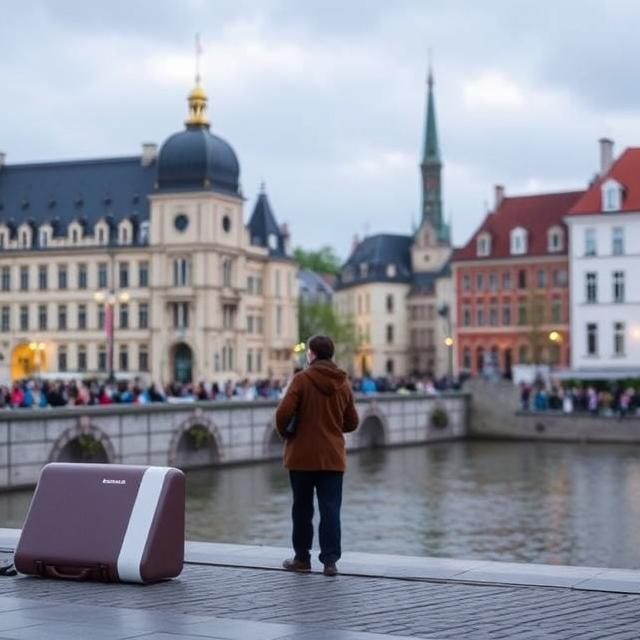Experiencing the world for cheap is all about being resourceful, planning ahead, and making conscious choices that align with a budget-friendly lifestyle. Whether you’re traveling long-term or just want to explore new destinations on a limited budget, there are countless ways to make your dream of world travel a reality without breaking the bank. Here’s how to do it:
1. Book Budget Flights
- Use Fare Comparison Websites: Platforms like Skyscanner, Google Flights, and Kayak allow you to compare flights across multiple airlines and booking websites. These tools help you find the cheapest flights available. Set price alerts to get notified when fares drop.
- Travel During Off-Peak Seasons: Airfares fluctuate based on the season, with summer and holidays being the most expensive times to fly. Traveling during the off-season, like late fall or early spring, can save you a significant amount on flights.
- Consider Budget Airlines: In many regions, budget carriers like Ryanair (Europe), AirAsia (Southeast Asia), and Southwest (U.S.) offer affordable flight options. Be aware of additional fees, such as for baggage or seat selection, but even with those, they can often be a bargain compared to traditional carriers.
- Be Flexible with Your Dates: If your travel dates are flexible, you can find much cheaper flights. Use tools that show flexible dates or look for “cheapest month” options to identify when to book.
2. Accommodation on a Budget
- Hostels: Hostels are a popular and affordable option for budget travelers. Platforms like Hostelworld and Booking.com allow you to book dormitory beds or private rooms at budget prices. Hostels also give you the opportunity to meet fellow travelers.
- Couchsurfing: This free accommodation service connects travelers with locals who offer a free place to stay. It’s a great way to experience the local culture and save money on accommodation.
- Airbnb: For longer stays or when traveling with a group, consider renting a private room or apartment through Airbnb. You can often find affordable options, especially if you’re traveling in less touristy areas.
- Camping: If you love the outdoors, camping is an extremely cheap (and sometimes free) way to stay. Many national parks and even beaches allow camping for a small fee or no fee at all.
- Work Exchange Programs: Websites like Workaway, WWOOF, and HelpX offer opportunities to work in exchange for accommodation and food. You might help out on a farm, teach English, or assist in a hostel in exchange for free room and board.
3. Use Public Transportation
- Trains and Buses: Public transport is often the cheapest way to get around a city or country. In Europe, the Eurail pass offers unlimited train travel for a set number of days, making it an excellent option for exploring multiple destinations.
- Local Buses and Trams: Many cities have inexpensive bus or tram networks. In places like Southeast Asia or India, buses can take you between cities or regions affordably.
- Ride-Sharing: Services like Uber, Lyft, or BlaBlaCar allow you to share rides with locals and other travelers, cutting transportation costs. BlaBlaCar, in particular, is popular in Europe and South America, where drivers offer empty seats for a fee.
- Walk or Bike: In many cities, walking or renting a bicycle is often the cheapest and most efficient way to get around, especially in smaller towns or cities with good pedestrian infrastructure.
4. Eat Like a Local
- Street Food: Street food can offer delicious meals at a fraction of the price of restaurant dining. In regions like Southeast Asia, Latin America, and parts of Africa, street vendors serve local dishes that are cheap and authentic.
- Supermarkets and Local Markets: Save money by buying fresh ingredients and preparing your own meals. Many hostels and guesthouses provide kitchen facilities. Cooking your own meals can drastically reduce food costs, especially if you’re staying in one place for a while.
- Avoid Tourist Traps: Restaurants near major tourist attractions tend to be overpriced. Instead, look for places where locals eat, which will often be much cheaper and provide a more authentic experience.
- Meal Deals and Lunch Specials: In many countries, lunchtime offers cheaper menu options. Look for restaurants that offer lunch specials or fixed-price menus for travelers.
5. Take Advantage of Free Activities
- Walking Tours: Many cities offer free walking tours, where you can learn about the local culture, history, and landmarks from knowledgeable guides. While these tours are free, it’s customary to tip the guide based on your budget.
- Nature Exploration: National parks, beaches, hiking trails, and other outdoor attractions are often free or have a very low entry fee. Hiking, biking, or swimming in natural settings is a great way to experience a place without spending money.
- Free Museum Days: Many museums offer free admission on certain days of the month or have discounted prices for students, seniors, or locals. Do some research before you visit to find these deals.
- Local Festivals and Events: Many cultural festivals and events are free to attend. These can include local music festivals, parades, or public celebrations, which give you a taste of the local culture without a price tag.
6. Travel Slowly
- Stay Longer in One Place: Traveling slowly can save you money. You’ll spend less on transportation and accommodation by staying in one place for an extended period. Plus, you’ll have the chance to experience a destination more deeply and enjoy local experiences rather than constantly moving from place to place.
- Long-Term Accommodation: Renting a room or apartment for a month is often cheaper than staying in a hotel or hostel for shorter periods. Look for long-term rentals on websites like Airbnb, or find house-sitting opportunities where you can stay for free in exchange for taking care of someone’s property.
7. Volunteer or Work Abroad
- Work Exchange: Platforms like Workaway and WWOOF offer opportunities to work in exchange for accommodation and meals. Tasks can include anything from teaching English to helping on a farm or working in a hostel. This allows you to save money while gaining local experience.
- Teach English: Many countries, particularly in Asia and Latin America, have a high demand for English teachers. Programs like TEFL (Teaching English as a Foreign Language) or TESOL (Teaching English to Speakers of Other Languages) can provide you with paid work abroad, often including accommodation or meal stipends.
- Volunteer: Many volunteer programs offer free accommodation and food in exchange for work. This is particularly popular in rural or developing countries, where you might work on social projects or environmental conservation efforts.
8. Travel Insurance and Health Care Savings
- Affordable Travel Insurance: While it’s important to have travel insurance, it doesn’t have to be expensive. Compare different policies on websites like World Nomads or SafetyWing to find the best deals for long-term travelers.
- Healthcare Savings: Consider traveling with a basic health kit (pain relievers, bandages, etc.) and using low-cost clinics or pharmacies when needed. In some countries, healthcare is very affordable or even free for travelers.
9. Use Travel Reward Points
- Frequent Flyer Miles: If you’ve accumulated any travel points or frequent flyer miles from credit cards or past flights, you can use them to reduce the cost of flights, hotels, or activities.
- Travel Credit Cards: Consider signing up for travel credit cards that offer rewards points, sign-up bonuses, and travel benefits like lounge access or travel insurance. These points can help offset the cost of flights or accommodations.
10. Research Local Deals and Discounts
- Local Discount Websites: Websites like Groupon or LivingSocial often offer discounted deals on tours, activities, and restaurants. This is especially useful when you arrive in a new destination and want to find affordable options quickly.
- Tourist Cards: Many cities offer tourist passes that provide discounted entry to popular attractions and include free or discounted transportation. Examples include the I Amsterdam Card or Paris Pass.





